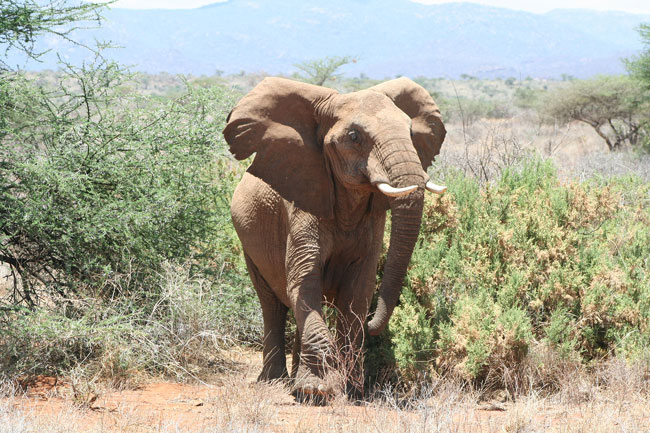Elephants Run From Bees

Elephants are the largest beasts alive on land today. Yet these goliaths are afraid of bees, researchers have discovered. The giants flee when they hear the buzz of a bee swarm.
Their fear could be used to help protect them. The researchers figure strategically placed beehives might serve as low-tech elephant deterrents, to reduce conflicts between man and beast that often lead to the pachyderms being killed.
"If we could use bees to reduce elephant crop-raiding and tree destruction and enhance local income through the sale of honey, this could be a significant step forward towards sustainable human-elephant coexistence," said zoologist Lucy King at the University of Oxford in an email sent from a tent in the Samburu National Reserve in Kenya.
Scientists had previously suspected that elephants preferred to steer clear of bees. For instance, in Kenya, observers noticed that elephants damaged acacia trees with empty or occupied beehives significantly less than trees without hives. In Zimbabwe, researchers saw elephants forging new trails in order to avoid beehives.
To be fair, honeybees native to eastern and southern Africa (Apis mellifera scutellata) are notoriously aggressive, especially near their hives. Swarms have even been known to kill African buffalo.
King and her colleagues sought to confirm whether bees could drive away elephant herds and thus serve as deterrents. First, the team digitally recorded the buzz of agitated African bees.
"We recorded our bee sounds from a wild hive that we found inside a tree trunk along the Ewaso Ng’iro river in Samburu," King recalled. "Recording the sounds was tricky as I wanted to disturb the beehive to record the real aggressive sound that elephants might encounter if they were to disturb a beehive in the wild."
Sign up for the Live Science daily newsletter now
Get the world’s most fascinating discoveries delivered straight to your inbox.
They first tried holding a microphone in front of the hive and dropping a stone into the core of the tree trunk. "This partially worked but the bees were so aggressive that even with our bee suits on we got swarmed with bees and didn't hold the microphone very straight for very long! We retreated a bit too fast!" King said.
"In the end, I rigged up a platform in front of the hive where we strapped on the directional microphone and mini-disc recorder so that we could remove ourselves from the area during the recording," she said. "I dropped a stone into the hive to trigger the attack and then we ran like hell back to my Land Rover and sealed ourselves inside for a good 15 minutes while the bees did our recording for us. It was actually a fun day despite one or two stings getting through our suits!"
The researchers played back four-minute clips of this buzzing via wireless speakers hidden inside fake plastic tree trunks to elephant families resting under trees in Kenya during the midday heat. Sixteen of the 17 families tested fled within 80 seconds of hearing the bee sound, and half responded within just 10 seconds. The one family that did not respond to the buzzing was young and perhaps had not experienced bee attacks before.
"When you first mention this idea to people, they usually chuckle at the images it invokes, as it seems so improbable that such a large, powerful creature like an elephant could possible be afraid of tiny bees," King told LiveScience. Still, "the sting of an African bee is absolute agony to humans—believe me, I know!—so it's not impossible to imagine that being stung in the sensitive areas around the eyes, behind the ears and even up the trunk would be similarly painful to an elephant."
A key aspect of these new findings is "that whole herds of elephants moved away together from the sound," King explained. "If only one or two moved away, the use of bees as a deterrent would only be partially useful." The scientists detailed their findings in the October 9 issue of the journal Current Biology.
The hope now is to use beehives to deter elephant herds from human farmland "and therefore contribute to a safer future for both elephants and the people who have to live with them," King said.
- Video: Elephants Flee Buzzing Bees
- 10 Amazing Things You Didn't Know about Animals
- Gallery: The World's Biggest Beasts











